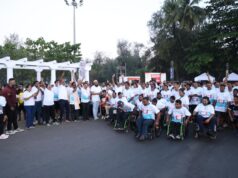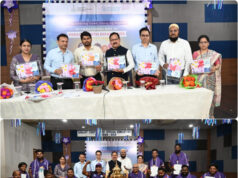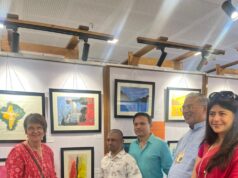The Office of the State Commissioner for Persons with Disabilities, Goa in partnership with National Centre for Promotion of Employment for Disabled People (NCPEDP), collaborated with Tata Institute of Social Sciences (TISS)-Mumbai to host a highly productive consultancy meet in Goa.
The purpose of this event was to discuss the status of the Rights of Persons with Disabilities (RPWD) Act 2016 in the western region of India. The consultation aimed to provide a platform for dialogue, establish a way forward and promote the empowerment of people with disabilities in Maharashtra, Rajasthan, Gujarat Lakshadweep and Goa.
Chief Guest for this consultation, Goa Minister for Social Welfare, Subhash Phaldessai, stated: “The long due census is one of the major concerns for the disability sector. In the absence of proper data the allocation of budget for the sector is never justified. The missing millions should be included in stats; the number is much higher than the present data available. The larger disabled population is in villages which must be identified & addressed to reach the last mile development. We have come a long way but there are miles to be covered.”
In his keynote address State Commissioner for Person with Disabilities, Goa, Guruprasad Pawaskar, emphasised on the importance of such a consultation which will help in observing the legislation and prepare the vision for the entire disability sector.
“We care deeply about the rights and empowerment of persons with disabilities. The NCPEDP consultancy meet was an essential opportunity for learning from each other, tackling challenge, and strengthening cooperation towards making employment opportunities more inclusive,” said Guruprasad Pawaskar, the State Commissioner for Persons with Disabilities.
Setting the context of the consultation, Arman Ali, Executive Director, NCPEDP, said: “June 2023 marks six years of the RPwD Act, a landmark legislation recognising 21 disabilities compared to the previous 7. It ensures equal rights, inclusive employment, accessible healthcare, and improved infrastructure. In view of this, NCPEDP has been holding regional consultations in South, North-East, East, North, and West zones in the last few months to assess the status of people with disabilities in the key thematic areas of education, sports, employment, health, disaster management and accessibility, specifically in the context of gender and Sustainable Development Goals (SDG) realisation.”
“The western region of the country has a high prevalence of disabilities, yet people with disabilities remain marginalized and excluded. Being a hub for trade and tourism, the region holds potential for generating livelihoods and reducing poverty among disabled individuals,” he added.
The day-long consultation extensively addressed several key issues related to disability inclusion. These included challenges in disability-inclusive education, particularly in relation to the National Education Policy (NEP) 2020. It also focused on access to healthcare services, including rehabilitation facilities, health insurance schemes, reproductive and sexual health, as well as the certification process for disabilities and associated challenges.
Access to information and infrastructure in various domains such as education, employment, tourism, sports, and political participation was discussed. The consultation also highlighted challenges in employment for people with disabilities in the public and private sectors, as well as the promotion of self-employment.
Mainstreaming women with disabilities, disability inclusion across the SDGs, and prioritizing outreach to persons with disabilities during disasters were also key thematic areas of discussion.
The consultation brought together participants from NGOs representing the Western states, organisations representing persons with disabilities, professionals working in disability rights, State Commissioners for Persons with Disabilities, and government representatives.






